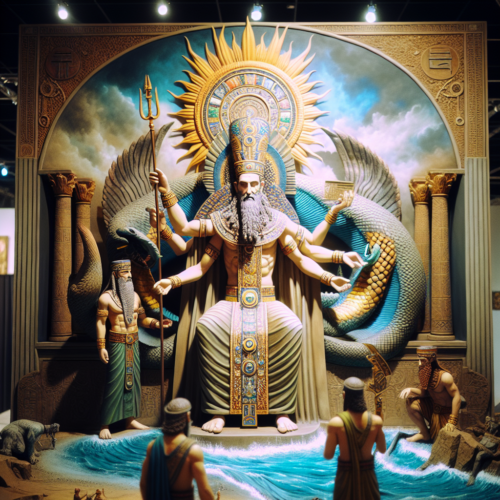Enki (Akkadian: Ea) is the god of water, wisdom, creation, and culture. He plays a central role in Mesopotamian religion, particularly in Sumerian, Akkadian, and Babylonian traditions. Enki is both architect and mediator. He is a problem-solver who shapes the cosmos, protects life, and gifts civilization to humankind.
Description and Abilities
Enki rules the Abzu, the freshwater abyss beneath the earth. From this sacred depth, he directs rivers, irrigation, fertility, and creation. He is also the guardian of the Me. These are the divine decrees that define everything from kingship to craftsmanship.
Unlike storm gods or warrior figures, Enki acts through intelligence and adaptability. He uses trickery, insight, and speech to guide fate rather than force. His interventions often save mortals from divine punishments, or restore balance after cosmic errors.
He is typically shown wearing a horned crown, with streams of water flowing from his shoulders. These symbolize the Tigris and Euphrates, the lifeblood of Mesopotamia. His sacred animals — the goat, fish, and turtle — suggest fertility, wisdom, and resilience. The hybrid goat-fish, later known as Capricorn, reflects his dual nature.
Origin and Family
Enki is typically described as the son of Anu, the sky god, and Nammu, the primordial sea goddess and creator. In some traditions, his essence arises from the union of Apsu (fresh water) and Tiamat (salt water), reinforcing his role as a mediator between order and chaos, heaven and earth. His consort is Damkina (Damgalnuna), and their son is Marduk, the later Babylonian chief deity.
Meaning and Etymology
The name Enki combines the Sumerian words EN (“lord”) and KI (“earth”), meaning “Lord of the Earth.” Despite the terrestrial title, his domain lies beneath — in the life-giving waters of the Abzu, sustaining the physical world from below.
Mythological Appearances
- Atrahasis – he warns the hero of the coming flood and instructs him to build a survival vessel.
- Enuma Elish – he slays Apsu, averting a cosmic purge of the younger gods.
- Enki and Ninhursag – A narrative of creation, desire, and divine dysfunction in paradise.
- Inanna’s Descent – he sends the gala spirits to rescue Inanna from the underworld.
- Inanna and Enki – A myth in which he, while drunk, hands over the Me to Inanna, allowing her to empower Uruk.
- Enki and the World Order – he distributes powers and responsibilities to gods and regions of the world.
- Enki and Ninmah – A mythic contest about the limits of creation and the divine response to disability.

Appearances in modern culture
- The Lost Book of Enki: Memoirs and Prophecies of an Extraterrestrial God by Zecharia Sitchin – A fictionalized account portraying Enki as an alien.
- African Temples of the Annunaki: The Lost Technologies of the Gold Mines of Enki
- Enki and the World Order: A Beginner’s Guide – A modern summary of Enki’s role.
- Myths from Mesopotamia: Creation, the Flood, Gilgamesh, and Others by Stephanie Dalley:
- The Sumerians: Their History, Culture, and Character by Samuel Noah Kramer – Describes Enki’s cultural and religious significance in early Sumer.
- Inanna, Queen of Heaven and Earth: Her Stories and Hymns from Sumer by Diane Wolkstein and Samuel Noah Kramer: Includes stories where Enki and Inanna clash or cooperate.
- Gods, Demons and Symbols of Ancient Mesopotamia: An Illustrated Dictionary by Jeremy Black and Anthony Green: Offers concise entries on Enki’s symbols and functions.
